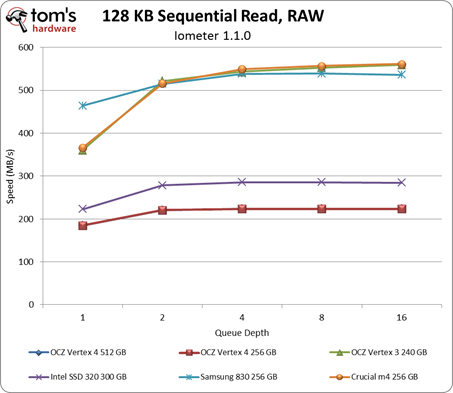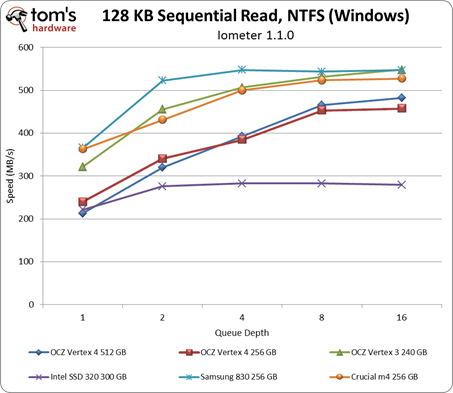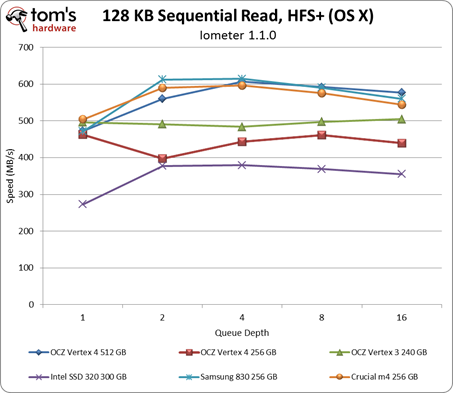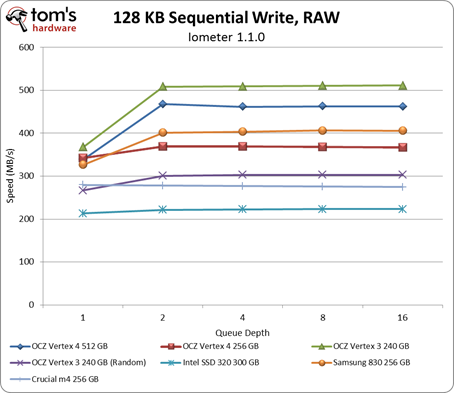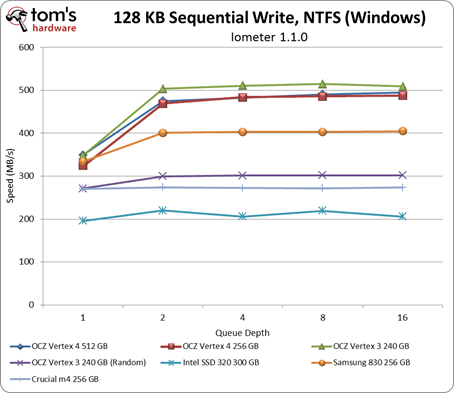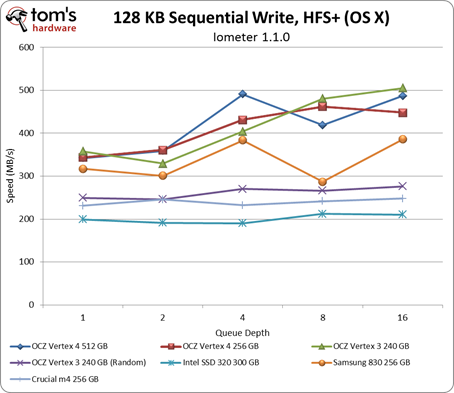OCZ Vertex 4 Review: A Flagship SSD Powered By...Indilinx?
128 KB Sequential Performance: RAW, Windows, And Mac
Sequential Read Performance
Examples include file copying, transcoding, game level loading, some gameplay, watching video, and editing video
In sequential read testing, the 256 GB and 512 GB Vertex 4s deliver identical performance, though it's hard to tell the lines are overlapping in the chart above. Regardless, it's clear that testing physical blocks doesn't favor OCZ's newest SSD. With speeds just above 200 MB/s, the Vertex 4 doesn't appear to live up to the Vertex namesake. Even Intel's SSD 320 enables faster transfers.
The results clearly change when we switch to testing within a file system. In NTFS specifically, both Vertex 4s start out at ~210 MB/s and climb as high as 480 MB/s after hitting a queue depth of 16. Although Samsung's 830 and OCZ's Vertex 3 deliver better performance, the Vertex 4 is not far behind.
Almost all of the SSDs are affected by host caching in a Mac environment, which is why you see most drives start around 500 MB/s. Interestingly, the 512 GB Vertex 4 exceeds the Vertex 3's performance, following a similar performance path as the 256 GB Crucial m4. The 256 GB Vertex 4 falls a bit behind, though. It's still able to beat Intel's SSD 320, but falls shy of OCZ's 240 GB Vertex 3.
Sequential Write Performance
Examples include Application Installation, Document Backup
Get Tom's Hardware's best news and in-depth reviews, straight to your inbox.
SandForce-based SSDs reign supreme when it comes to writing compressible data, which explains why the 240 GB Vertex 3 maintains such a huge lead. At a queue depth of two, the Vertex 3 is the only SSD able to break through 500 MB/s. However, the 512 GB Vertex 4 doesn't fall far behind, which is encouraging considering that OCZ actually cites lower write speeds on the 480 GB Vertex 3, meaning the bigger drive would be slower than what we see here.
Zeroing-in on drive performance faced with incompressible information, the Vertex 3 delivers close to 300 MB/s. Meanwhile, the Vertex 4 continues to excel since it doesn't rely on compression to achieve better results.
On our Mac, we again see a lead favoring the Vertex 4. Even at a queue depth of one, both Vertex 4s maintain a 15 MB/s edge over the older Vertex 3. This lead mostly continues as queue depth increases up to around eight.
Current page: 128 KB Sequential Performance: RAW, Windows, And Mac
Prev Page 4 KB Random Performance: RAW, Windows, And Mac Next Page PCMark 7 And Idle Power Consumption-
compton Octane was not a special and unique snowflake; Indeed, someone else's fingerprints were all over it. Vertex4 is certainly unique, but I fully expect the next round of drive launches using Marvell products to look like the V4, but possibly with some more balance.Reply -
billybobser Seems to good to be true.Reply
We'll see how they are once they've been out in the open for 6 months when problems will/will not flare up. -
maxinexus As Billy said only time will tell. These preliminary tests are great and pricing is better but still SSD are expensive...we need to get to cents not dollars per GB. Anyway good start OCZ...now the only thing you need is your own NANDs...perhaps in few yearsReply -
jgutz2006 This is a great step and makes financial sense for OCZ to come to market with a competitive product and possibly undercut all the others. Its a no brainer im my world. Force Samsung to sell units with less profit marginsReply -
Branden it'll be interesting to see how reliable these drives are and what their failure rate is going to be. OCZ's vertex 2 and 3 drives were horribly unreliable - in my experience 50% failure/DOA rate, my local shop said they see about 10% of them returned due to failure (and that's just within their 2 week return window alone).Reply
sorry OCZ, you've lost my business this time around. i've since replaced all my remaining OCZ SSD's with crucial m4's, they may not quite perform as well as your latest offerings but in my experience reliability > performance. -
JackNaylorPE When I built Son No.2 's box, we installed the Seagate Barracuda XT on Friday and measured boot times at 21.2 seconds to the Password entry screen. The Vertex 3 arrived on Monday and after installing that, we measured boot times at 15.6 seconds. Not commenting on the actual times as differences in hardware as well as testing parameters could push it in any direction, but what I will comment on is the HD choice for this test.Reply
My testing showed it took 36% extra time to boot off the HD instead of the HD. This test has it taking 226 % longer. If we're gonna test the best SSD's, I'd sure like to see a best in class HD added to the comparisons. -
burnley14 Brandenit'll be interesting to see how reliable these drives are and what their failure rate is going to be. OCZ's vertex 2 and 3 drives were horribly unreliable - in my experience 50% failure/DOA rate, my local shop said they see about 10% of them returned due to failure (and that's just within their 2 week return window alone).sorry OCZ, you've lost my business this time around. i've since replaced all my remaining OCZ SSD's with crucial m4's, they may not quite perform as well as your latest offerings but in my experience reliability > performance.It's interesting because so many people have talked about how unreliable they are, but in my personal experience (a small sample size, granted) I've been very pleased with both the Vertex 2's performance and reliability and the Agility 3's. Maybe I'm just lucky.Reply -
drwho1 all I read was: support for 2TB... *drooling*Reply
Price for 2TB SSD?
*not drooling anymore* -
OntarioHero Hmmm. Basically OCZ decided "Indilinx too slow! sod it, stick 1GB buffer in there!"Reply
